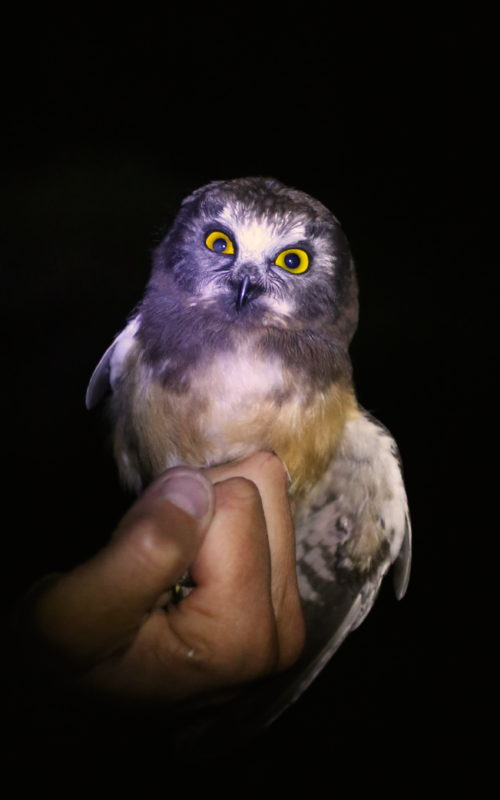
Juvenile Northern Saw-whet Owl mist-netted and banded on Mt. Mansfield, 27 July 2016. © Carla Skinder
VCE enjoyed an eventful, if quiet, final summer field trip to our long-term study site on the Mt. Mansfield ridgeline. We arrived in early evening on July 27 and set up 28 mist nets under ideal conditions — barely a breath of wind, warm, patchy cloud cover. Vocal activity was markedly lower than a week earlier, with very few birds calling or singing, and no noticeable dusk “chorus”. Singing consisted solely of a few snatches from robins and white-throats. Only a handful of Bicknell’s Thrushes (BITH) called, none sang, and not a peep was heard from any Swainson’s Thrushes.
By nightfall we had captured a nice assortment of 15 birds that included 7 BITH (6 juveniles and a new adult female). The evening’s undisputed highlight was a juvenile Northern Saw-whet Owl that elicited oohs and aahs from our several visitors. Its bill-snapping belied a docile nature in the hand, and we all watched it fly silently off in near-full darkness with a new size 4 band on its feathered tarsus.
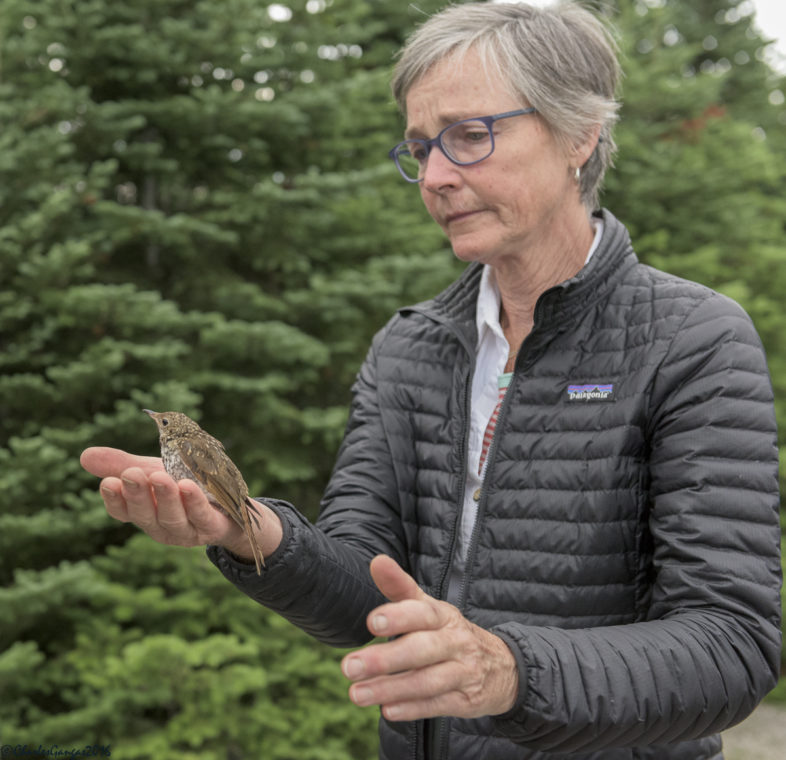
Marcy Blauvelt with a banded juvenile Bicknell’s Thrush that just doesn’t want to leave, Mt. Mansfield, 28 July 2016. © Chuck Gangas
Expectations for a busy morning of netting fell flat, though the first 2-3 hours saw steady action. Despite continued calm winds, temps in the mid-60sF, and cloud cover, activity was light. Few birds vocalized, and the ridgeline was very quiet overall. Many adults are now in flight feather molt, which helps to explain their limited movements, but we were surprised not to capture more free-flying juveniles. We caught only a handful of birds after 9 am and closed our nets at noon with a total of 46 birds over our combined evening-morning session.
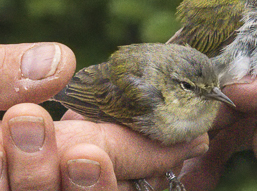
Adult female Tennessee Warbler mist-netted and banded on Mt. Mansfield, 28 July 2016. © Chuck Gangas
Our biggest surprise was finding 2 adult female Tennessee Warblers simultaneously in adjacent nets. This boreal breeder (not confirmed to nest in VT during the 2003-2007 Breeding Bird Atlas) is well known for its unusual tendency to disperse south of its Canadian breeding range in early summer and to actively molt flight feathers while migrating. One of the two females we captured had dropped its innermost two primaries on each wing. Other non-local captures included two juvenile Hermit Thrushes and our third Blackburnian Warbler of the summer.
Totals:
Northern Saw-whet Owl 1 juvenile
Yellow-bellied Flycatcher 2 juveniles
Bicknell’s Thrush 13 (1 new adult female, 10 new juveniles, 2 retrap juveniles)
Swainson’s Thrush 1 yearling male
Hermit Thrush 2 free-flying juveniles
American Robin 2 free-flying juveniles
Tennessee Warbler 2 adult females caught simultaneously, 1 in early primary molt
Blackburnian Warbler 1 immature
Blackpoll Warbler 3 (2 new adult females, 1 retrap adult male)
Yellow-rumped (Myrtle) Warbler 4 (1 return adult male, 1 retrap adult female, 2 juveniles)
Dark-eyed (Slate-colored) Junco 10 (2 new adult females, 2 repeat males, 6 juveniles)
White-throated Sparrow 5 (3 new adult males, 2 juveniles)
Although we haven’t yet fully summarized the season’s results, we had >450 captures between mid-May and late July, a higher number than in most years. Over the past 3 summers, raw numbers of adult captures of three target species show no clear trends. For any kind of meaningful comparison among years, our totals must be examined against the number of annual net hours (an indication of effort). This summer’s spike in Blackpoll Warbler numbers — especially of males — is difficult to explain, but encouraging.
2014 2015 2016
Bicknell’s Thrush 45 (30M, 13F, 2U) 42 (26M, 15F, 1U) 35 (24M, 11F)
Swainson’s Thrush 19 (15M, 4F) 12 (10M, 2F) 23 (20M, 3F)
Blackpoll Warbler 33 (23M, 10F) 28 (13M, 15F) 50 (33M, 17F)
(M=male, F=female, U=unknown sex)
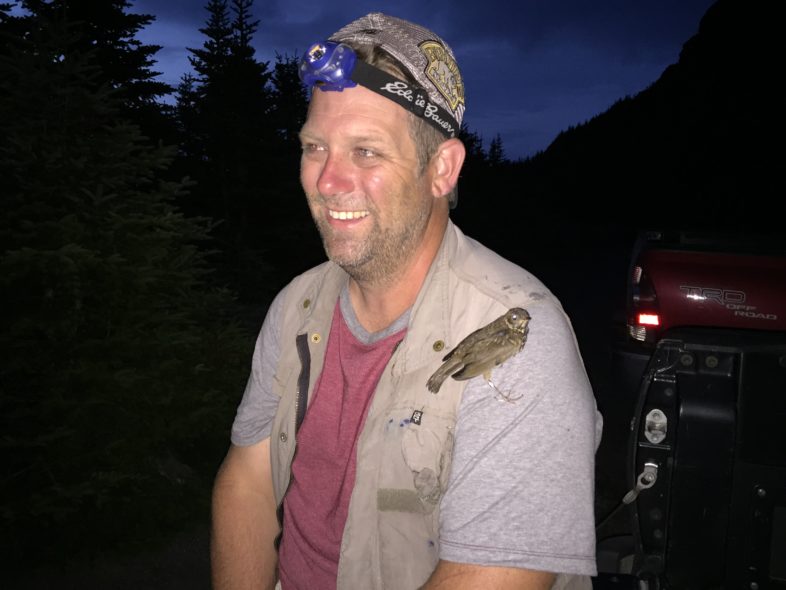
Brendan Collins with a juvenile banded Bicknell’s Thrush reluctant to liberate itself, pre-dawn on Mt. Mansfield, 28 July 2016. © Carla Skinder
This was the third consecutive season of non-existent red squirrel numbers on Mansfield, and numbers of yearling birds (an indication of productivity in the preceding summer) reflected it. Among known-age birds, we captured 14 yearling vs. 21 older (2+) adult BITH, while this ratio was 17:6 in Swainson’s Thrush and 26:21 in Blackpoll Warbler. Cone crops are again very light this summer, and the record 15 juvenile BITH we caught likely foretell strong recruitment again next summer.
We’ll make a final foray in mid-September to wrap up our 2016 field season and will report back then.
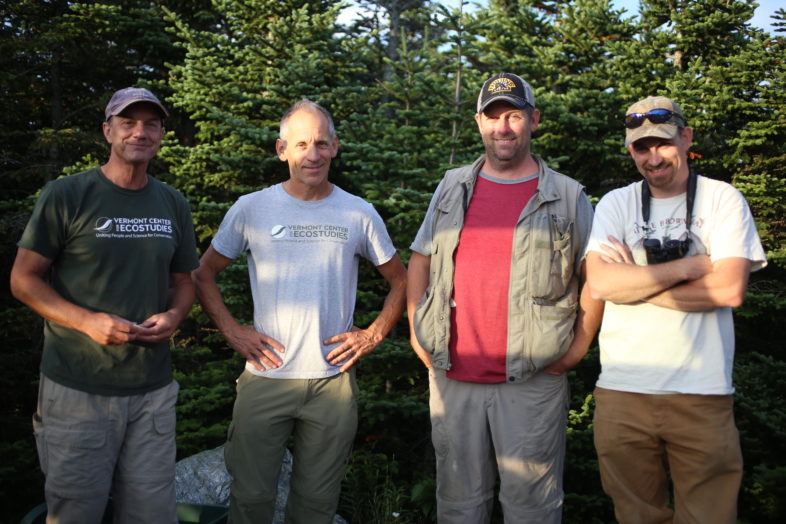
VCE banding team on Mt. Mansfield, 28 July 2016. L-R Steve Faccio, C. Rimmer, Brendan Collins, Noel Dodge. © Carla Skinder

Wonderful moment for me to be able to be a part of the team.
Many thanks for using 2 of my photos.
VCE rocks:)